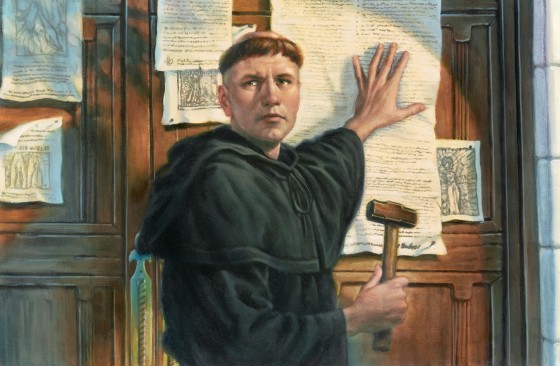
Dear Friends, Brothers, and Sisters,
Did you know that 2019 marks the 500th anniversary of the Swiss Reformation, that which birthed, not the Lutheran, but the Reformed churches?! We haven’t heard much about it this year, have we? But here it is.
On January 1, 1519, when a priest named Ulrich Zwingli began his ministry at the Großmünster cathedral in Zürich, Switzerland he did something radical. He began preaching through the gospel according to Matthew at the beginning of chapter one, and continued until he finished the book! In preaching through Matthew, Zwingli revived the ancient practice of the lectio continua, the continuous reading and preaching through books of the Bible as opposed to the lectio selecta, the selective lectionary noting different passages for different Sundays and holy days. The result was epic. It led to the Reformation in Switzerland, the most thoroughly biblical and intentional Reformation of them all, exerting tremendous influence in Scotland, England, Germany, France, the Netherlands, Hungary, and all over the world, conforming the belief and practice of the Church to the word of Christ and removing those unwarranted doctrines and practices which had crept in slowly over the ages in the Roman Catholic Church.
Luther’s Reformation in Germany in many ways tried to retain as much tradition from Rome as possible without contradicting the gospel, including its view of the corporeal (physical) presence of Christ in holy communion, feast days, altars, allowing vestments, and lectionary readings. In comparison to the German Reformation, to which we Reformed are nonetheless very much indebted, the Swiss Reformation was much more thoroughgoing in its Sola Scriptura “Scripture Alone” approach to the worship and government of the church, casting aside those practices that did not have a Scriptural warrant. And this emphasis on practicing only that form of worship and government that has Scriptural warrant, still guides the worship and government of our Reformed churches today in the OPC and in sister churches.
It is in commemoration of this providence of God 500 years ago that I have published a book summarizing the German and Swiss reformation, comparing and contrasting the two. At a mere 48 pages, it is accessible and possibly a helpful introduction for a churchgoer or other interested person who would like to have a basic grasp of the persons and events of the Protestant Reformation. It is written in a warm and affectionate tone as the fruit of my readings and study of this topic. I hope that this little book may be beneficial to some.
The Reformation in Germany and Switzerland is available for order here.
The paperback costs $5.45. The e-book is $3.99.
Be blessed! Give thanks for God’s work in history. And be Reformed!



 If, as William Ames put it, theology is the “science of living blessedly forever”, Reformed Theology is its most self-consistent and biblical expression. Forged in the ancient struggles of the church fathers against pernicious heresies, formed in the 16th century struggle to rescue the true Church from her Babylonian captivity, and bathed in the blood of the martyrs, it consists of a series of doctrinal loci (derived entirely from the sixty-six books of Scripture,) and their logical interrelation. It fits together as a seamless system, but no one particular doctrine overshadows the rest; the whole counsel of God in Scripture is summarized and systematized without any artificial construct or over-emphasis of one over the other. The starting point for theology is God Himself, and His self-revelation both general and special. From there His decrees are understood, and His means of carrying them out (in Creation and Providence.) From there we understand Man, the Covenants, the Fall, and Christ the Mediator. These loci are more or less expressed commonly by all the major Reformed theologians who wrote systematic theologies from Calvin to Turretin, Dabney and Hodge. They are furthermore clearly expressed in the Reformed confessions, as sources of instruction but also protection for the Church, such as the Westminster Confession of Faith, the Belgic Confession, the Canons of Dordt, the French Confession of Faith, the Scots’ Confession, the Heidelberg catechism, etc. Reformed theology has been tested and tried, and has corrected much false teaching in Church history. It must continue to be refined, but must never alter or remove those landmarks that have been established based upon careful reflection on the Holy Scriptures. Reformed theology is Christianity come to its own, its fullest and most consistent expression. It magnifies the grace of God over the pride of man, humbles the sinner, and comforts the penitent. It is powerful medicine to cure the spiritual condition of everyday people that we meet. It is motivation and an effective tool for evangelism. It is a powerful method of discipleship. It is what every true Christian would like to know and believe, even if they do not know it yet.
If, as William Ames put it, theology is the “science of living blessedly forever”, Reformed Theology is its most self-consistent and biblical expression. Forged in the ancient struggles of the church fathers against pernicious heresies, formed in the 16th century struggle to rescue the true Church from her Babylonian captivity, and bathed in the blood of the martyrs, it consists of a series of doctrinal loci (derived entirely from the sixty-six books of Scripture,) and their logical interrelation. It fits together as a seamless system, but no one particular doctrine overshadows the rest; the whole counsel of God in Scripture is summarized and systematized without any artificial construct or over-emphasis of one over the other. The starting point for theology is God Himself, and His self-revelation both general and special. From there His decrees are understood, and His means of carrying them out (in Creation and Providence.) From there we understand Man, the Covenants, the Fall, and Christ the Mediator. These loci are more or less expressed commonly by all the major Reformed theologians who wrote systematic theologies from Calvin to Turretin, Dabney and Hodge. They are furthermore clearly expressed in the Reformed confessions, as sources of instruction but also protection for the Church, such as the Westminster Confession of Faith, the Belgic Confession, the Canons of Dordt, the French Confession of Faith, the Scots’ Confession, the Heidelberg catechism, etc. Reformed theology has been tested and tried, and has corrected much false teaching in Church history. It must continue to be refined, but must never alter or remove those landmarks that have been established based upon careful reflection on the Holy Scriptures. Reformed theology is Christianity come to its own, its fullest and most consistent expression. It magnifies the grace of God over the pride of man, humbles the sinner, and comforts the penitent. It is powerful medicine to cure the spiritual condition of everyday people that we meet. It is motivation and an effective tool for evangelism. It is a powerful method of discipleship. It is what every true Christian would like to know and believe, even if they do not know it yet.


